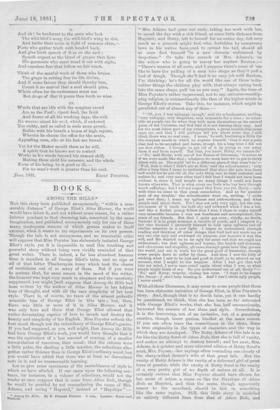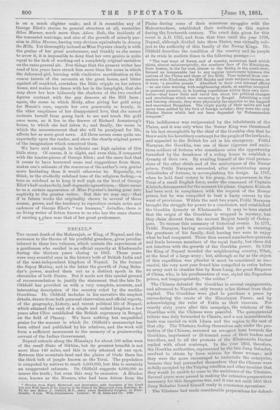BOOKS.
AMONG THE HILLS.* HAD this story been published anonymously, "within a mea- :surable distance" of George Eliot's Silas Marne'', the world would have taken it, and not without some reason, for a rather inferior pendant to that charming tale, conceived by the same imagination, and published anonymously only for one of those many inadequate reasons of which genius makes to itself ,excuses, when it wants to try experiments on its own powers. 'Though the tale is not anonymous, and no reasonable critic will suppose that Miss Poynter has elaborately imitated George• Eliot's style, yet it is impossible to read this touching and powerful story without being very vividly reminded of that great writer. There is, indeed, a far less abundant humour than is manifest in all George Eliot's tales, and no sign at All of that bitter Thackerayan irony which took the charm szif restfulness out of so many of them. But if you were to assume that, for some reason in the mood of the writer, the humour was kept very much in abeyance and the causticity suppressed, you might :well suppose that Among the Hills had been written by the author of Silas Harney in her loftiest tone of thought, and with all the rare simplicity of her best :style. There is, of course, no trace of the almost pedantic scientific bias of George Eliot in this tale ; but, then, there was little or none of it in Silas Minter, and it was only here and there that George Eliot allowed that rather devastating caprice of hers to invade and destroy the beauty and simplicity of her English. Miss Poynter reflects the best mood, though not the redundancy of George Eliot's genius. If you had supposed, as you well might, that Among the Hills had been George Eliot's work, you would have thought that it was the equivalent of a less amount of musing, of a smaller .accumulation of resources, than usual; that the colours were a little paler, the shading a little scantier, the reflections alto- gether rather thinner than in George Eliot's ordinary mood, but you would have added that there was at least no discordant note in it, and no unseasonable learning.
Let us give some specimens of the resemblances of style to which we have alluded. If one came upon the following sen- tence, for instance, in a volume of selections, would not the reader at once suppose that it came from Adam Bede, though he would be puzzled by not remembering the name of Mrs. Adams, and seeing " Haysted," instead of " Hayslope "
" Among the Hills. By E. Frances Poyntor. 2 vols. London: Hurst and Elaolittt.
" Mrs. Adams had gone out early, taking her work with her, to spend the day with a sick friend, at some little distance front Haysted ; and Hetty, left to herself for an entire day, felt very much as a peacock might feel, who, forbidden by sumptuary laws in his native barn-yard to spread his tail, should all at once find himself in a new domain unfettered by despotism." Or take this remark of Mrs. Adams's, on the widow who is going to marry her nephew Reuben :— " There's women of all sorts, and I suppose there's some of 'em like to have the pulling of a man into shape as they'd pull a loaf of dough. Though she'll find it no easy job with Reuben, I'm thinking ; he's for all the, world like one of those india- rubber things the children play with, that always spring back into the same shape, pull 'em as you may." Again, the tone of Miss Poynter's rather impersonal, not to say, universe-worship- ping religion, is extraordinarily like that of the higher minds in George Eliot's stories. Take this, for instance, which might be paralleled out of almost any of them :—
" Oh, yes, I was unhappy enough,' said the schoolmaster, smiling, very unhappy, very desperate, very miserable for a time; as miser- able as people can be when they look upon themselves as the central point of the Universe, and find that it is not turning their way. And for the most bitter part of my unhappiness, a great trouble that came upon me, and that I will perhaps tell you about some day, I still think there was no real cure. I mean,' he said, hesitating a little for the simplest words in which to express himself, that it was a pain that had to be accepted and borne, though for a long time I did not see that either. I thought to got rid of it by trying to ruts away from it and from myself. But that, you know, Iletty, we cannot do. —` No,' said Hetty, with one of her flashes of bitterness, 'it seems as if we were made like that ; whatever we most hate we've got to carry about with us. The world 'ad be a different place if that wasn't so.'— 'Well, that is what I didn't see at first,' said the schoolmaster ; only after a long time I came to understand that since the pain was there and could not be got rid of, the only thing was to have patience and endure it ; and very soon after that I felt that I would not have been without it, since it had taught me many things I could not have known otherwise. That is what every ono feels who has been through much suffering; but I will not expect that from you yet, Iletty,—only with time we come to that great consolation. And as for another part of my trouble,' the schoolmaster went on, smiling, I quite got over that ; I mean my ugliness and awkwardness, and what people said about them. For I was not only very ugly, but the con- sciousness of it made me both shy and awkward when I was a lad, and like a foolish young fellow that I was, I chose to make myself very miserable because I was not handsome and accomplished, like some of my friends. But that I quite got over ; chiefly, no doubt, because it is in great measure a trouble of youth, and I outgrew it ; but also because I presently learned to look upon ugliness and all similar miseries in a new light. I began to understand, through reading and thinking of other things, that God had not made me or any ono also ugly and awkward on purpose, just because it was His will, and He wanted us to be ugly for some end that we could not understand ; but that ugliness and beauty, like health and sickness, and cleverness and stupidity, all came through great laws that govern the world, and are in truth for the groat good of humanity, though some people have to suffer by them. And then I saw the folly of wishing what I saw to be just and good in itself, to be altered on my account, that I might be the happier. After I had got that well into my mind, I never once cared ngain about what I was, or what people might think of me. Do you understand me at all, Hotly ?'- 'No,' said Hetty, wearily, closing her eyes. 'I want to be happy like Jenny—I caret help wanting it. And I can't abide ugly people, I never could."
With all these likenesses, it may occur to some people that there has been elaborate imitation of George Eliot, in Miss Poynter's story. And, though that is no doubt false, yet it can hardly be questioned, we think, that she has been so far saturated with George Eliot's works, that she has, half unconsciously, borrowed the essence of her ideas and style. Nevertheless, it is the borrowing, not of an imitative, but of a genuinely creative, though lesser genius, kindled at the same source. If you can often trace the resemblance in the ideas, there is true originality in the types of character, and the way in which they are developed. The Hetty Adams of this tale is so far like the Hetty Sorel of Adam Bede, that she is full of vanity, and makes an attempt to destroy herself ; and her aunt, Mrs. Adams, is a quieter and more educated edition of Hetty Sorel's aunt, Mrs. Poyser,—her sayings often reminding one closely of the sharp-witted farmer's wife of that great tale. But the vanity of Iletty Adams is the vanity of a deformed girl of great force of passion, while the vanity of Hetty Sorel is the vanity of a very pretty girl of no depth of natare at all. It is certainly curious that Miss Poynter should have chosen for her scene of action a name so like the Hayslope of Adam Bede as Haysted, and that the scene, though apparently nearer to the moorland, should be laid in something like the same region. Still, this little story is modelled on entirely different lines from that of Adam Bede, and. is on a much slighter scale ; and if it resembles any of George Eliot's stories in general structure at all, resembles Silas Marner, much more than Adam, Bede, the incidents of the concealed marriage, and also of the growth of miserly pas- sion in Silas 3farner, having very obvious equivalents in Agnew) Ole Hills. Yet thoroughly imbued as Miss Poynter clearly is with the genius of her great predecessor, and frankly as she seems to avow it, it is impossible to deny that her own genius is quite equal to the task of working out a completely original variation on the same general air. Few things that the present writer has read of late years have struck him more than the scene in which the deformed girl, burning with vindictive mortification at the coarse taunts of the servants at the great house, and bitter against all mankind, overtakes the little cripple on her return home, and makes her dance with her in the lamplight, that she may show her how hideously the shadows of the two crooked figures contrast with the gay dancers at the Hill farm ; again, the scene in which Hetty, after giving her gold away for Nessie's cure, regrets her own generosity so keenly, in the utter emptiness of her disappointed love, that she cannot restrain herself from going back to see and touch the gold once more, as it lies in the drawer of Richard Armstrong's house, to which she had taken it; and finally, the scene in which the announcement that she will be paralysed for life, affects her as mere good news. All three scenes come quite un- expectedly upon the reader, and show the clearly original power of the imagination which conceived them.
We have said enough to indicate our high opinion of this little story. Of course, it is slight, and even thin, if compared with the master-pieces of George Eliot ; and the mere fact that it seems to have borrowed some real suggestions from them, makes one's estimate of the resources of the author's own genius more hesitating than it would otherwise be. Especially, we think, in the studiedly subdued tone of the religious feeling,—a tone so subdued as to keep it well nigh on the level of George Eliot's half-melancholy, half-dogmatic agnosticism,—there seems to us a certain appearance of Miss Poynter's having gone into captivity to the greater writer. But this we may say,—that if in future works the originality shown in several of these scenes, grows, and the tendency to reproduce certain notes and cadences of George Eliot's "vox humane," dwindles, there is no living writer of fiction known to us who has the same chance of earning It place near that of her great predecessor.

































 Previous page
Previous page